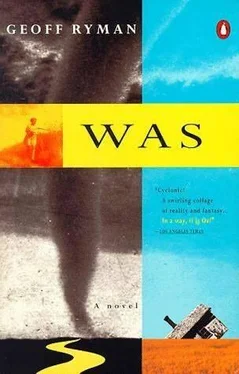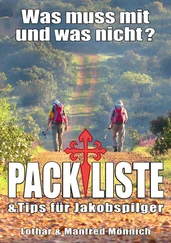"What kind of birds?"
"Chickadees," said Mrs. Baker, and she and Jonathan shared a smile.
They walked on, toward the shed. It was tiny, square. A thick limestone chimney rose up one side of it, supporting a vine. The frame of the front doorway was jammed up hard against the frame of a window. There were thick beams holding the whole structure off the ground.
"We have a lot of people asking to see this," said Mrs. Baker. "This is an original pioneer dwelling."
She and Jonathan walked around to the side.
"They were embarrassed," said Jonathan. Bill came around to join them. From under the apex of the roof, flat planks of wood covered part of the log walls.
"See? They didn't want anyone to know they still lived in a log cabin, so they covered it with clapboards," said Jonathan.
There was another door on this side of the cabin. "Why two doors?" Bill asked.
Jonathan touched an outline in the ground with his foot. "There was an extension on this side," he said. "I bet it was a summer kitchen."
"I bet it was too," chuckled Mrs. Baker. "It would get awfully hot without one."
Farther up the hill, there was a 1940s car. Jonathan walked on toward it, more crickets jumping out at him. The car had a long sleek hood, a short rounded trunk. Its paint had faded and rusted.
"That's my grandson, Paige," explained Mrs, Baker. "He collects old machines. Tractors mostly. Some of them you have to crank up to start. He even has one that runs on butane. They're in the other building, if you would like to see them."
Jonathan looked at the car in silence.
"Paige wants to be a farmer. We know there's no future in it. But we just have to hope he sees that for himself. Do you know, they are bulldozing some of the old farmhouses?"
Jonathan's smile was fixed, his eyes unfocused.
There was a rumbling of a tractor up the road. "Well," said Mrs. Baker. "Here comes my husband. I'll just go down and check the oven, if you want to come along presently."
"Thank you very much, Mrs. Baker," said Bill. Jonathan did not move. Mrs. Baker walked back down the hill toward the wind chimes.
Jonathan was holding his breath.
"Breathe, Jonathan, slowly and deeply."
"It's green and red, isn't it, Bill?" he said, without breath.
"What is?"
"The car!" Jonathan was smiling in wonder. "It's green and red, very pastel in patches, like someone had airbrushed it. Very light, very metallic?"
"I'd say that's a pretty good description."
Jonathan turned toward him, still smiling. "I'm seeing green and red," he said, and clenched Bill's arm. "I'm not supposed to be able to. I'm supposed to be color-blind.
"And the trees," he added. "And the crickets, in a flash."
Bill looked at his watch: quarter past one.
Jonathan leaned over and lost all the water he had just drunk. Bill stroked his back.
In the driveway, Mr. Baker was patting the Dalmatian's head. Mr. Baker wore dungarees. He was a big man, but faded, with watery blue eyes and blue veins in pale skin. He held a clean new straw hat in one hand. His wife came out of the house.
"Vance," she said. "These two gentlemen came to ask me about Sunflower School." She introduced Bill and Jonathan. Vance shook their hands and smiled with perfect false teeth.
Jonathan showed him the photograph.
"Well, I'll be," said Mr. Baker. "That's my sister!" He pointed to a little girl in checked gingham.
"And that will be Miss Soupens, the teacher."
"Was there another Sunflower School? One before that?" Bill asked.
"Why yes, there was."
"Where?" asked Jonathan, his voice rough.
"Stand over here, young man," said Mr. Baker. He leaned over Jonathan's shoulder and pointed. "See that hump of trees there? That's where it used to be. You see, the Worrells wanted to be able to say they were helping everybody so they built a new schoolhouse and paid the teacher. But the old schoolhouse was there until, oh, 1961. Thereabouts. Old Paul Jenkins lived in it with his mother. I think he set it alight when she died."
"Yee hah!" Jonathan screeched. His voice gave way, and he began to cough.
The Bakers smiled a bit nervously, and Mr. Baker stepped back. "Well, I'm pleased to have been able to help," he said.
Jonathan kept coughing, unable to speak. He doubled over, hand over his mouth. He danced in place, still happy.
"Thank you, thank you very much. It really means a lot to him," said Bill.
"Well, you're both very welcome," said Mrs. Baker. Jonathan was still coughing, smiling, shaking his head.
"Now, if you'll excuse us, my husband needs his lunch," said Mrs. Baker. "Then he'll go lie down. I'm afraid he's not very well either."
The Bakers walked back to their house, arm in arm.
"We did it," croaked Jonathan.
They drove on down the lane, through fields of plowed, rich, brown-black soil. Off to the right, far away on the horizon, there was a slight rise of trees, with a white, test-tube tower. It was the hill over Manhattan.
"Stop," whispered Jonathan, his voice gone. He patted Bill's arm.
Ahuh ahuh ahuh.
Bill eased the car to a stop. One-thirty.
"The hill," whispered Jonathan, and pointed to the left. His skeleton hands fluttered against the window.
There it was in bald ziggurat layers. Dorothy's hill.
"It's around here. It really is!" chuckled Bill.
"Hurry," said Jonathan.
As Bill drove, Jonathan seemed to fold up smaller and smaller on the front seat. He leaned back, mouth open. His lips were cracked. As the car bounced up onto the main road, he began to talk to someone.
"Sure they will be. I know they will be," he said, hoarse. "They'll be there."
Then Jonathan paused, as if listening.
"But you didn't die," Jonathan answered. "You grew up. Into me."
They came to the lane. rock spring, said the sign. The clump of trees was at the crossroads. Bill turned right and parked the car. The lane was unpaved, white gravel, and it led in a straight line to the ziggurat hill. A row of old-fashioned telephone poles ranged along it on the left, like a line of crucifixes. Two huge farm machines stood some way away amidst the sorghum. On the other side of the lane, the field was harvested, bare earth, thrashed stalks. Everything was seen. Everything was visible.
Quarter to two. We've done it. Thank you, Jesus.
Bill patted Jonathan's knee. "Come on, kiddo," Bill said. "Let's go see it."
Jonathan still smiled. He didn't move.
"Come on, Jonathan."
"Yes, Daddy," he answered in a whisper. He stirred slowly.
Bill helped him out of the car. Bill got out the plat-book map and turned it upside down, south on the top.
"You're not going to believe this, Jay," said Bill, with a nervous chortle. "The Bakers' farm? That was it, Jonathan. That cabin. That was the house. That was where she lived."
Jonathan moved as if he were on a ship at sea. His smile was fixed. Did he even understand?
"Let's go have a look at where the school was," said Bill. There was a collapsed fence of barbed wire that he had to hold down and a ditch beyond it that made climbing over the wire difficult. They had to duck under and around small conifers or larger ash trees. And then, unmistakably, there was a clearing, a clearing where a building had been.
Jonathan stepped into it and smiled toward one end. "Hello," he said. He stood still in the low grass with its purple heads.
"This is where the school was," said Bill.
Or maybe not. In the midst of the thicket there was another building, gray and parched.
"Let's go and have a look at that there," said Bill. He fought his way through leaves and whiplike branches. He swept them away from his face. He saw a window, some kind of shed or outbuilding perhaps.
"Wait for me," he heard Jonathan whisper behind him.
Читать дальше












